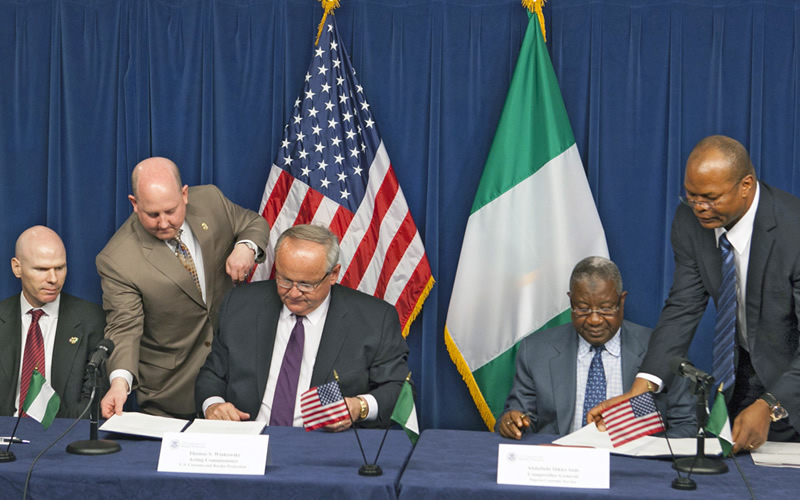TOP STORY: US and the Republic of Nigeria sign the Customs Mutual Assistance Agreement
WASHINGTON – On behalf of the United States and the Federal Republic of Nigeria, officials from U.S. Customs and Border Protection (CBP) and U.S. Immigration and Customs Enforcement (ICE) signed a Customs Mutual Assistance Agreement (CMAA) April 22 with Nigeria Customs Service Comptroller General Abdullahi Dikko Inde. This agreement marks a significant milestone in collaboration between the two countries.
The bilateral agreement is a valuable tool for CBP and ICE in cooperation with the Nigeria Customs Service to prevent, repress and investigate customs offenses. CMAAs provide for mutual assistance to ensure the accurate assessment of customs duties and taxes, and in efforts to combat illicit cross-border activities to include contraband smuggling, financial crimes such as customs fraud and money laundering and international terrorism.
"Customs authorities around the globe are on the frontline, securing nations and communities against the threat of terrorism and transnational crime while facilitating legitimate commerce," said CBP Acting Commissioner Thomas S. Winkowski. "This agreement strengthens our nations' resilience against threats by expanding cooperation and information sharing."
"This agreement will enable our customs authorities to expand efforts to protect our borders through the timely and secure exchange of information. We look forward to future opportunities for collaborative enforcement efforts with the Nigeria Customs Service," said ICE's Homeland Security Investigations, Office of International Affairs, Acting Assistant Director Peter S. Vincent.
CBP and ICE have used bilateral CMAAs as a valuable part of law enforcement efforts. These agreements provide a legal framework for information sharing and cooperation between customs administrations as they combat transnational crime and endeavor to protect their respective national frontiers.
Currently, CBP and ICE have 66 CMAAs with other countries and the American Institute in Taiwan.
CBP is one of the Department of Homeland Security's largest and most complex components, with a priority mission of keeping terrorists and their weapons out of the U.S. It also has a responsibility for securing the border and facilitating lawful international trade and travel while enforcing hundreds of U.S. laws and regulations, including immigration and drug laws.
ICE is the largest investigative arm of the U.S. Department of Homeland Security. ICE is a 21st century law enforcement agency with broad responsibilities for a number of key homeland security priorities.


